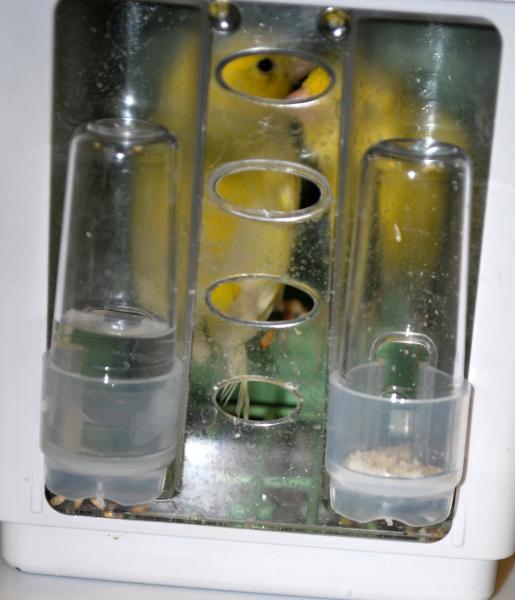STERLING, Va. – A U.S. Customs and Border Protection agriculture detector dog had a traveler at Washington Dulles International Airport singing like a canary recently when the canine detected agriculture products in the traveler’s baggage, including two yellow canaries.

inside a passenger's baggage.
While working the baggage retrieval floor on October 9, CBP agriculture canine “HairE” alerted to one traveler’s baggage. When asked if the traveler was carrying any agriculture products, the traveler, who arrived from Albania, fessed up to possessing two live canaries in a birdcage. During a subsequent baggage examination, CBP agriculture specialists also detected about nine pounds of crabapples and quince.
CBP agriculture specialists destroyed the prohibited fruit and consulted with U.S. Department of Agriculture (USDA) Veterinary Services authorities regarding the final disposition of the live canaries.
Canaries are susceptible to pathogenic avian influenza and to combat pathogenic viruses, the USDA regulates the importation of live birds. Prior to travel to the U.S. with a live bird, travelers must obtain several certifications from the traveler’s home country health and veterinary officials attesting that the birds are disease-free, and acquire import permits from the USDA and U.S. Fish and Wildlife Service (for certain protected species). Travelers then must arrive at a designated port of entry where USDA officials conduct examinations upon arrival. Finally, the live birds must remain in quarantine for 30 days. The traveler possessed no such certifications or permits.
The USDA offered the traveler options to properly import the canaries, but instead the traveler decided to abandon the canaries. USDA took possession of the canaries.
“Customs and Border Protection detector dogs are critical to safeguarding our nation’s agricultural industries in that they can quickly and easily detect prohibited agriculture products that travelers may or may not declare,” said Casey Durst, Director of Field Operations for CBP’s Baltimore Field Office. “CBP’s agriculture protection mission is vital to our nation’s economic security by detecting the extraordinary threat posed by invasive insects and highly pathogenic animal and plant diseases to our nation’s agricultural resources.”
CBP agriculture specialists have extensive training and experience in the biological sciences and agricultural inspection, inspect tens of thousands of international air passengers, and air and sea cargoes nationally being imported to the United States.
During a typical day last year, CBP agriculture specialists across the nation seized 4,695 prohibited plants, meats, animal byproducts, and soil, and intercepted 314 insect pests at U.S. ports of entry. See what else CBP achieved on a typical day during 2019.
Please visit CBP Ports of Entry to learn more about how CBP’s Office of Field Operations secures our nation’s borders. Learn more about CBP at www.CBP.gov.
Follow the Director of CBP’s Baltimore Field Office on Twitter at @DFOBaltimore and on Instagram at @dfobaltimore for breaking news, current events, human interest stories and photos.

